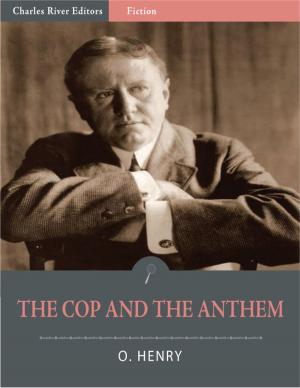The Patriot Traitor: The Life and Legacy of Benedict Arnold
Nonfiction, History, Americas, United States, Colonial Period (1600-1775), Revolutionary Period (1775-1800), Biography & Memoir, Historical| Author: | Charles River Editors | ISBN: | 9781475319446 |
| Publisher: | Charles River Editors | Publication: | November 14, 2012 |
| Imprint: | Language: | English |
| Author: | Charles River Editors |
| ISBN: | 9781475319446 |
| Publisher: | Charles River Editors |
| Publication: | November 14, 2012 |
| Imprint: | |
| Language: | English |
*Explains Arnold's achievements for the Americans, his treason, and how he has been remembered. *Includes pictures of Arnold and important people, places, and events in his life.*Includes a Table of Contents. Neglected by Congress below, distressed with the small-pox; want of Generals and discipline in our Army, which may rather be called a great rabble, our credit and reputation lost, and great part of the country; and a powerful foreign enemy advancing upon us, are so many difficulties we cannot surmount them. Benedict ArnoldOn October 7, 1777, Benedict Arnold rode out against orders and led an American assault against British forces led by General John Burgoyne in one of the climactic battles of the Revolution at Saratoga, the ultimate turning point of the war. Near the end of the most important American victory of the Revolution, Arnolds leg was shattered by a volley that also hit his horse, which fell on the leg as well. Arnold would later remark that he wish the shot had hit him in the chest. If it had, Benedict Arnold would be remembered as one of Americas greatest war heroes, and probably second only to George Washington among the generals of the Revolution. In fact, when Arnold was injured at the height of his success in October 1777, he had been the most successful leader of American forces during the war. Arnold had been instrumental in the seizure of Fort Ticonderoga in 1775, he constructed the first makeshift American navy to defend Lake Champlain and delay British campaigning in 1776, and he was the principal leader at Saratoga in 1777. Even his unsuccessful campaign to Quebec in the winter of 1775 is remembered primarily for the amazing logistical feats undertaken by Arnold and his men to even reach the target. History has accorded Arnold his fair share of credit for the fighting he participated in from 1775-1777. The problem is his contemporaries did not. Arnold was better on the field than any other American general in those years, but his mercurial personality rubbed some the wrong way, and other self-promoting generals, from Ethan Allen to Horatio Gates, credited themselves with success at Arnolds expense. Meanwhile, the Second Continental Congress frequently if inadvertently slighted Arnold, failing to duly promote him in a timely fashion and failing to pay him four years of back pay even as he spent his own private fortune training, equipping, and feeding his army and navy. Historian William Sterne Randall estimates Congress shorted Arnold out of the equivalent of 275,000.Today, of course, all of that has been overshadowed by Arnolds treacherous plot to turn over West Point to the British in 1780. The infamous plot came about while Arnold convalesced as the military governor in Philadelphia, where he met and married the Tory-affiliated Peggy Shippen. Arnold grew more concerned about the patriot cause, and combined with the perceived insults, exposure to Loyalist leanings, and another Congressional rebuke for living extravagantly in Philadelphia, Arnold decided to secretly offer his services to the British. As every American knows, Arnolds plot was uncovered, and he barely escaped to the British side, where he was just as distrusted and nearly as despised. Though he would serve as a brigadier-general for the British through the end of the war, his personal fortune and reputation were permanently tarnished. The man who could have been one of his countrys greatest heroes became its most despised traitor. The Patriot Traitor: The Life and Legacy of Benedict Arnold chronicles Arnolds life and military career, but it also humanizes the man and offers an objective look at Arnolds treachery and plot in an effort to separate fact from legend. Along with pictures of important people, places, and events in his life, you will learn about Arnold like you never have before, in no time at all.
*Explains Arnold's achievements for the Americans, his treason, and how he has been remembered. *Includes pictures of Arnold and important people, places, and events in his life.*Includes a Table of Contents. Neglected by Congress below, distressed with the small-pox; want of Generals and discipline in our Army, which may rather be called a great rabble, our credit and reputation lost, and great part of the country; and a powerful foreign enemy advancing upon us, are so many difficulties we cannot surmount them. Benedict ArnoldOn October 7, 1777, Benedict Arnold rode out against orders and led an American assault against British forces led by General John Burgoyne in one of the climactic battles of the Revolution at Saratoga, the ultimate turning point of the war. Near the end of the most important American victory of the Revolution, Arnolds leg was shattered by a volley that also hit his horse, which fell on the leg as well. Arnold would later remark that he wish the shot had hit him in the chest. If it had, Benedict Arnold would be remembered as one of Americas greatest war heroes, and probably second only to George Washington among the generals of the Revolution. In fact, when Arnold was injured at the height of his success in October 1777, he had been the most successful leader of American forces during the war. Arnold had been instrumental in the seizure of Fort Ticonderoga in 1775, he constructed the first makeshift American navy to defend Lake Champlain and delay British campaigning in 1776, and he was the principal leader at Saratoga in 1777. Even his unsuccessful campaign to Quebec in the winter of 1775 is remembered primarily for the amazing logistical feats undertaken by Arnold and his men to even reach the target. History has accorded Arnold his fair share of credit for the fighting he participated in from 1775-1777. The problem is his contemporaries did not. Arnold was better on the field than any other American general in those years, but his mercurial personality rubbed some the wrong way, and other self-promoting generals, from Ethan Allen to Horatio Gates, credited themselves with success at Arnolds expense. Meanwhile, the Second Continental Congress frequently if inadvertently slighted Arnold, failing to duly promote him in a timely fashion and failing to pay him four years of back pay even as he spent his own private fortune training, equipping, and feeding his army and navy. Historian William Sterne Randall estimates Congress shorted Arnold out of the equivalent of 275,000.Today, of course, all of that has been overshadowed by Arnolds treacherous plot to turn over West Point to the British in 1780. The infamous plot came about while Arnold convalesced as the military governor in Philadelphia, where he met and married the Tory-affiliated Peggy Shippen. Arnold grew more concerned about the patriot cause, and combined with the perceived insults, exposure to Loyalist leanings, and another Congressional rebuke for living extravagantly in Philadelphia, Arnold decided to secretly offer his services to the British. As every American knows, Arnolds plot was uncovered, and he barely escaped to the British side, where he was just as distrusted and nearly as despised. Though he would serve as a brigadier-general for the British through the end of the war, his personal fortune and reputation were permanently tarnished. The man who could have been one of his countrys greatest heroes became its most despised traitor. The Patriot Traitor: The Life and Legacy of Benedict Arnold chronicles Arnolds life and military career, but it also humanizes the man and offers an objective look at Arnolds treachery and plot in an effort to separate fact from legend. Along with pictures of important people, places, and events in his life, you will learn about Arnold like you never have before, in no time at all.















